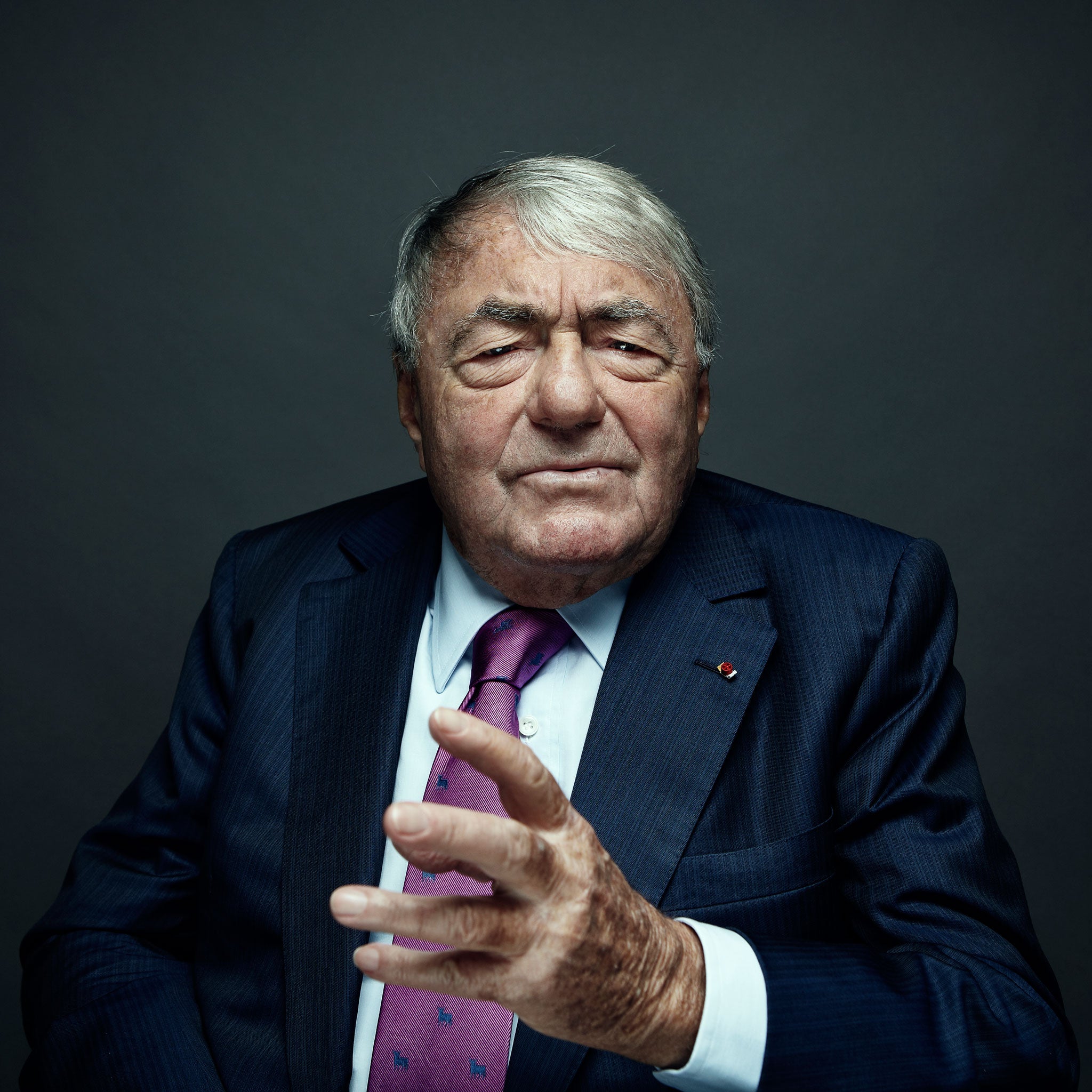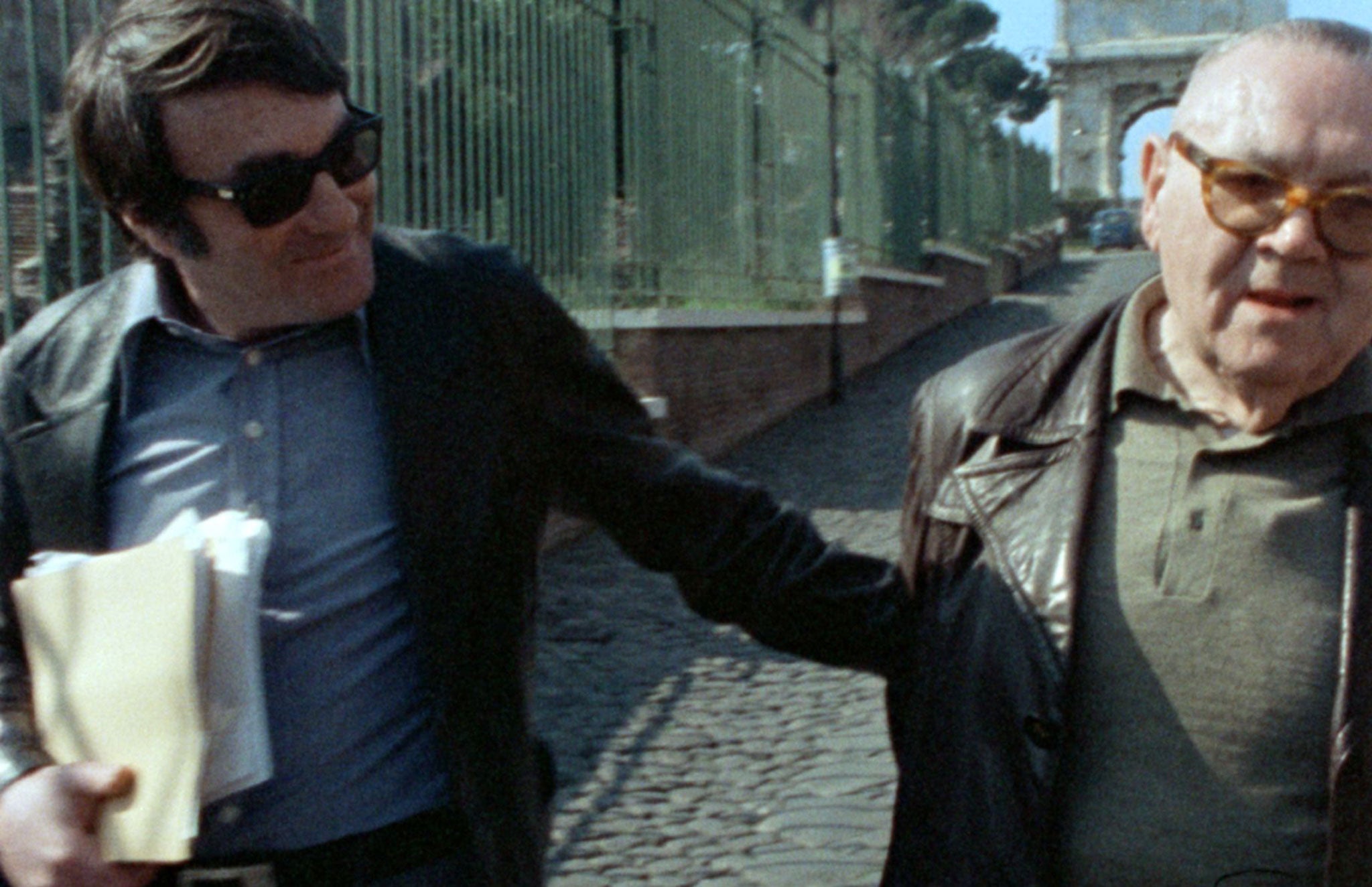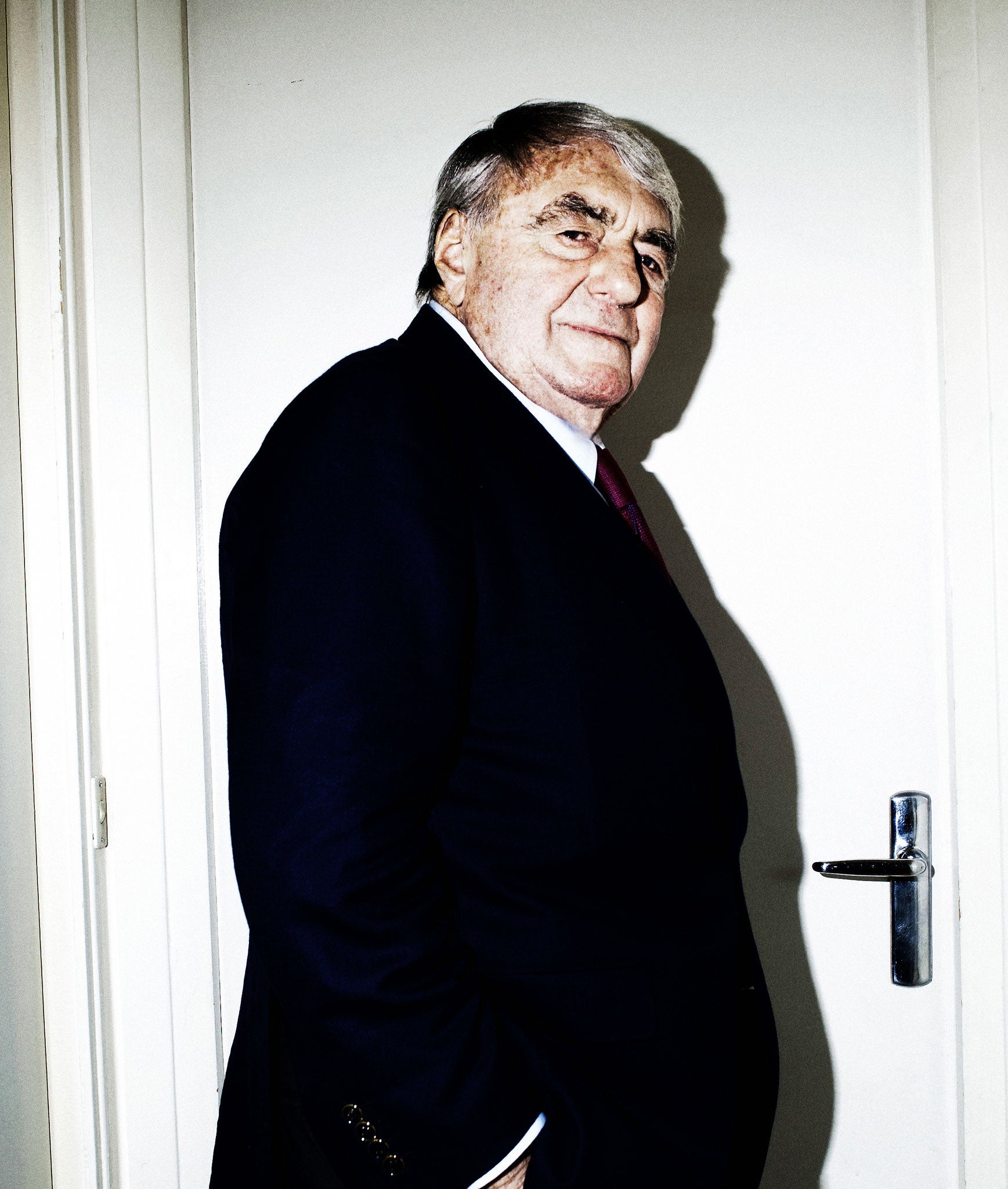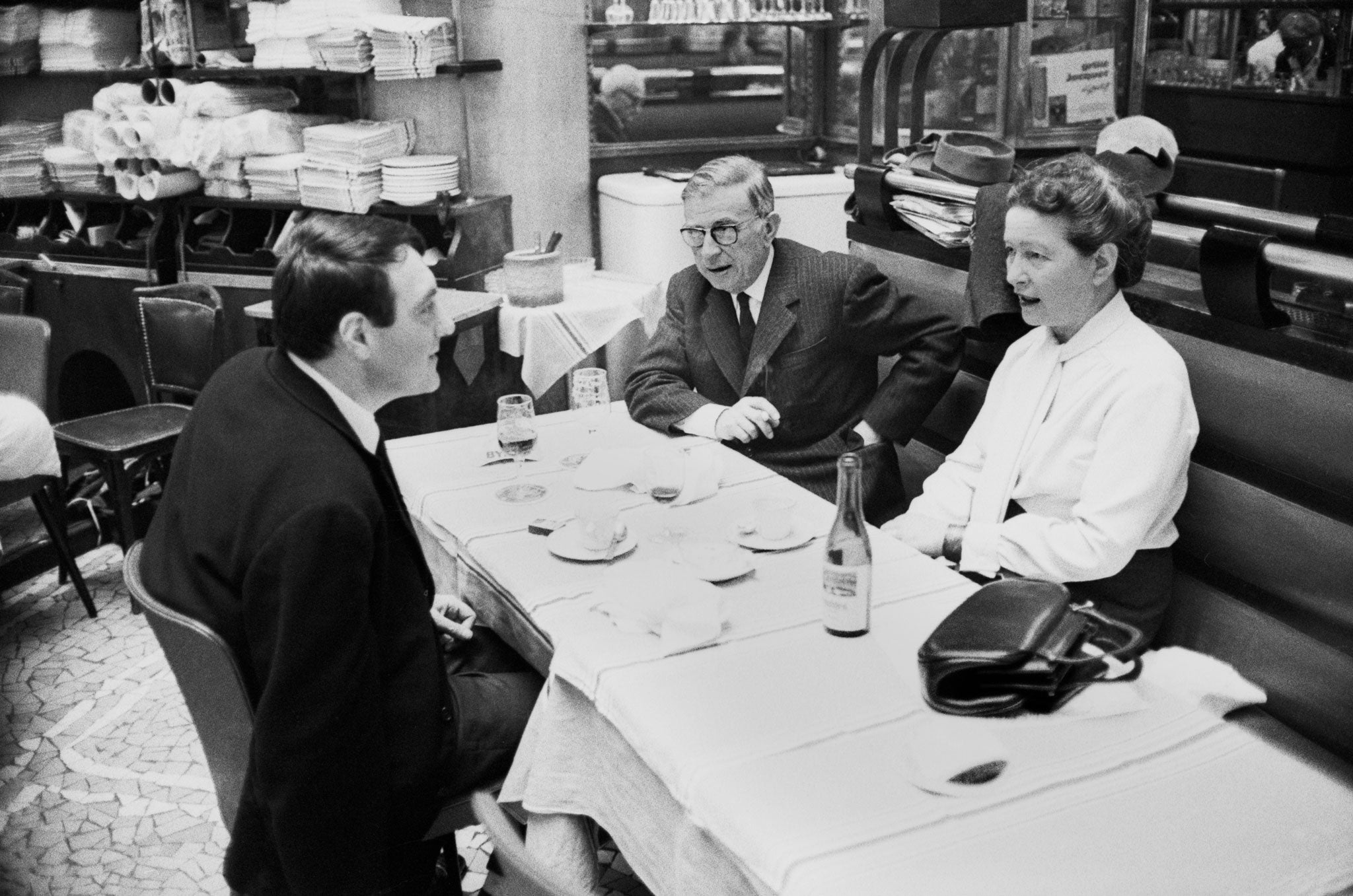Return to Shoah: Claude Lanzmann's new film The Last of the Unjust revisits Holocaust epic
Claude Lanzmann made his name telling the stories of the Holocaust in the epic documentary 'Shoah'. His new film, edited from previously discarded footage, is now helping to vindicate a Rabbi who saved thousands of Jewish lives by 'assisting' Adolf Eichmann and the Nazis in wartime Austria

Your support helps us to tell the story
From reproductive rights to climate change to Big Tech, The Independent is on the ground when the story is developing. Whether it's investigating the financials of Elon Musk's pro-Trump PAC or producing our latest documentary, 'The A Word', which shines a light on the American women fighting for reproductive rights, we know how important it is to parse out the facts from the messaging.
At such a critical moment in US history, we need reporters on the ground. Your donation allows us to keep sending journalists to speak to both sides of the story.
The Independent is trusted by Americans across the entire political spectrum. And unlike many other quality news outlets, we choose not to lock Americans out of our reporting and analysis with paywalls. We believe quality journalism should be available to everyone, paid for by those who can afford it.
Your support makes all the difference.Claude Lanzmann's nine-hour documentary about the Holocaust, Shoah, was hailed as a masterpiece when it was released in 1985. Now, he has returned to one of his interviewees from the film – a Rabbi accused of collaboration with the Nazi leadership in Vienna.
It may be the toothache ("Claude is so swollen and exhausted, he needs to rest," his assistant warns me as she pushes back the interview time). It may be the deafness that makes catching questions so difficult. It may just be an antipathy to his British interviewer. Whatever the reason, the 88-year-old French filmmaker appears to be in a foul mood when he finally agrees to speak.
Claude Lanzmann is best known to the British for Shoah – and for his magnificently entertaining, vainglorious autobiography, The Patagonian Hare (published in English in 2012), in which he details his experiences in the French Resistance as a very young man, his friendship with Jean-Paul Sartre and his love affair (and mountain-climbing expeditions) with Simone De Beauvoir, as well as his long struggles to complete Shoah.
There was nothing abstract or academic about Lanzmann's desire to make Shoah. He himself could easily have died in the Nazi camps. There is a passage early in his autobiography in which he describes an incident during his time in the Resistance. Late in the war, he was almost arrested while moving a trailer full of munitions and grenades across the countryside. His companion, a man called Bagelman, was armed but was too terrified to use his weapon. In the event, his father, also in the Resistance, appeared on a bicycle and intervened to save Lanzmann and the hapless Bagelman.
Lanzmann writes about meeting Bagelman once after the war and not being able to "utter a single word" to him because of his "criminal lack of courage, his inability to act and save our lives, the responsibility with which he had been formally entrusted".
I ask Lanzmann about the incident and why he was so severe toward Bagelman, who had clearly been scared out of his wits and who couldn't bring himself to shoot another man.
"He was an accomplice of a crime, this man," Lanzmann states categorically. If his father hadn't turned up by chance and started to shoot, he adds, "I would have been sent immediately to Auschwitz".
Lanzmann was "absolutely contemporary to the Shoah" (as he writes in The Patagonian Hare) and close to becoming one of its victims. Nonetheless, he had put the "terrifying reality" of the slaughter to the back of his mind. Before he embarked on the project that has come to define his life and career, he was a highly successful author and investigative journalist. "The terror it [the Shoah] evoked in me whenever I dared to think about it had consigned it to a different time, almost to another world, light years away, beyond human time," he wrote.
The idea for Shoah came not from him, but from his friend Alouph Hareven, director-general of the Israeli Ministry of Foreign Affairs, who, in 1973, had admired Lanzmann's documentary, Why Israel, and suggested Lanzmann was the only person who could make Shoah. However, Lanzmann made the film entirely on his own terms. This was a huge endeavour and before he could even start, he realised he needed a vast body of knowledge. The epiphany was that the subject of his film "would be death itself, death rather than survival". The Herculean challenge he set himself was for his film to "take the place of the non-existent images of death in the gas chambers". He didn't use archive material for the simple reason that images of death in the gas chambers were non-existent.

Watch Apple TV+ free for 7 days
New subscribers only. £8.99/mo. after free trial. Plan auto-renews until cancelled

Watch Apple TV+ free for 7 days
New subscribers only. £8.99/mo. after free trial. Plan auto-renews until cancelled

Shoah took more than a decade to complete. Since its release in 1985, Lanzmann has made additional films that have been linked to it, among them, A Visitor from the Living (1999), Sobibór, October 14, 1943, 4pm (2001), and The Karski Report (2010). Shoah, as The New Yorker recently wrote, is "not, of course, the end of Lanzmann's life or career, but it is his defining act".
Now, Lanzmann has come full circle, completing a new documentary, The Last of the Unjust, which is largely based around one of the very first interviews he did during the preparation for Shoah. Its subject is Benjamin Murmelstein, a Viennese Rabbi whom Lanzmann met over a week in Rome in 1975.
Murmelstein, who died in 1989, has been extremely badly treated by history. In 1944, the Nazis had made him what they sneeringly called the "elder of the Jews", their point of contact in Theresienstadt, a so-called "model ghetto" in Czechoslovakia that was in existence from November 1941 until the spring of 1945.
As Lanzmann's documentary demonstrates, Rabbi Murmelstein saved thousands of lives. He worked with the Germans for pragmatic and humanitarian reasons, first in Austria assisting senior Nazi officer Adolf Eichmann in organising deportations through the Central Office for Jewish Emigration, and then in Theresienstadt itself.
By keeping the ghetto going until the end of the war, he saved its inhabitants from the death marches ordered by Hitler. Nonetheless, at the end of the war, he was accused of being a collaborator by some survivors and arrested by the Czechs. Although there was no evidence against him, his reputation was ruined. Influential Israeli philosopher Gershom Scholem suggested that Murmelstein should be hanged.
The Last of the Unjust (which screened at the International Documentary Film Festival Amsterdam last year) vindicates its subject. The Murmelstein we see in Lanzmann's film is erudite, ironic, extremely articulate and with a huge frame of reference. He is also heroic.
"These long hours of interviews, rich in first-hand revelations, have continued to dwell in my mind and haunt me," Lanzmann writes in an intertitle at the start of The Last of the Unjust. For years, he "backed away from the difficulties of constructing such a film", but eventually decided that he had no right to keep Murmelstein's testimony to himself.
Lanzmann gives me an interview from behind his office desk in his apartment on the Rue Boulard, in the Montparnasse district of Paris. He has asked for an interpreter, although he ends up answering most of the questions in English.
In The Last of the Unjust, the rapport between the interviewer and his subject is evident. They clearly enjoyed one another's company. Murmelstein was very happy to encounter someone like Lanzmann, who shared his own fierce intelligence. There is a very touching moment at the end of the 1975 interviews showing Lanzmann and Murmelstein in Rome, walking off into the distance. Lanzmann puts his hand round Murmelstein. They're like Claude Rains and Humphrey Bogart at the end of Casablanca.
"I consider that he [Murmelstein] was an extraordinary man, a marvellous man, intelligent, full of intelligence, full of culture and of wit. I liked him very much," Lanzmann says.
This, though, wasn't the beginning of a "beautiful friendship" – the director freely admits that he didn't know what to do with the interview material which, in the end, wasn't used in Shoah. Murmelstein, according to his son, was "disappointed, but not too much surprised" to have been cut out eventually from Lanzmann's epic documentary.
"To start Shoah meant to make many trips in Germany, for instance, dangerous trips with the [old Nazis], in Poland and everywhere in the world," the director reflects. "I did not think of Murmelstein at this time. I put it [the interview] aside completely. When I started shooting [Shoah] in 1981, I did not know what to do with Murmelstein, because it did not fit with the rest of the film. Shoah is an epic film."
Lanzmann made Shoah without "one single word of commentary". The film is based around the testimony of witnesses – the camp survivors, Polish farmers and former Nazis. The film took five years to edit and 12 years in all to complete. If he had tried to include Murmelstein, "it would have taken me six hours more. It would have been totally impossible".

In the end, after discussion with Holocaust scholar Raul Hilberg, Lanzmann lodged the Murmelstein material with the Holocaust Memorial Museum in Washington.
To the director's fury, some of his interview with Murmelstein was subsequently screened in public without his permission. "I was incensed. It is my work, my face, my voice," he recalls. "At this time, I said, OK, if someone has to make a film about this, I will do it myself, nobody else!"
In The Last of the Unjust, Lanzmann himself shares the screen with Murmelstein. Alongside the 1975 interview material, there is recently-shot footage of the director revisiting the site of Theresienstadt. We see him at a deserted, provincial railway station. "Who in the world today knows the name of Bohusovice," the director in his late eighties, but still a formidable presence, asks as he walks the platform where, between November 1941 and the spring of 1945, 140,000 Jews were "disembarked".
"It is not a historical film," Lanzmann explains his own presence at the centre of The Last of the Unjust. "No, it is me, Claude Lanzmann, who made a film called Shoah and who made many other films about this – it is my concept, my problem. My implication in the film is absolute and total. There are three protagonists in the film, three actors. There is Murmelstein, there is Claude Lanzmann and there is... Claude Lanzmann. I am two. I am at the age of 50 and I am at my age now."
I ask Lanzmann if he was surprised by quite how closely Murmelstein worked with Adolf Eichmann over a prolonged period. He is angry at the question, which he takes as an implicit criticism of his subject.
"Monsieur, I will answer you. He [Murmelstein] saved the lives of 123,000 Jews. He rescued them," he states. "You have no idea what was [like] the occupation of Austria by the Nazis. He succeeded. He was himself pulling the strings. He was more intelligent than the Germans. He was able to foresee what they were preparing."
In the documentary, Murmelstein makes it very clear that Eichmann was heavily involved, in 1938, in the events of Kristallnacht ('the Night of Broken Glass') when the Nazis launched attacks against Jews and Jewish businesses. At Eichmann's trial in 1961, Murmelstein was astonished by the conclusion that he didn't participate. Murmelstein himself had seen Eichmann during Kristallnacht, commanding a team that was destroying a synagogue with hammers and axes.
"He [Murmelstein] explained that the Eichmann trial was a false trial. It was a very bad trial made by people full of prejudice and ignorance."
Murmelstein had the chance to flee Austria before the war. He could have emigrated to Israel, the US or Britain and led a quiet life as an academic or "well-settled rabbi". Instead, he chose to stay at the heart of the storm. He talks in the film of his "thirst for adventure" which kept him in Austria. By staying, and working with Eichmann (whom he detested) he was able to help other Jews to obtain exit visas and to flee.
"He [Murmelstein] fought like hell against the Nazis. He was accused at the end of the war by stupid Jews – because there were many stupid Jews, excuse me – because he refused to establish lists... He said to the Germans, 'You are stronger than us, if you want to kill us, kill us, but I will not give you names. I will not tell you who to kill, or who not to kill'."
Lanzmann is predictably dismissive of the writer and political theorist Hannah Arendt's reporting on Eichmann's trial and her coining of the phrase, "the banality of evil", that has since become a cliché.
"The 'banality of evil'? The most stupid sentence I ever heard," the filmmaker rages. "The banality of evil is the banality of the own conclusions by Mrs Arendt. That's all. It is totally meaningless."
By now, Lanzmann is irritated with the interview. "I cannot stand people with prejudice," he tells me. "It seems to me that you are prejudiced. I have the feeling that you didn't grasp what I wanted to convey with this film."
The director (who describes himself as "a close friend of Israel") likens me to some of the Israeli Jews who were hostile to Murmelstein. "They were very wrong. I will tell them," he says in advance of a planned trip to Israel for the premiere of the film there.

My only problem with The Last of the Unjust, which is a magnificent, complex and moving documentary, is one of timing. It has finally appeared 40 years after Lanzmann completed the original interview, and a full 25 years after Murmelstein's death.
Following my interview with Lanzmann, I contacted Murmelstein's son, Wolf Murmelstein, by email. Wolf confirmed how difficult his father's life was in Rome. From 1947 until 1949, Murmelstein sold lightbulbs for a living. From 1950 until 1973, he eked out an existence as a furniture salesman. On his death in 1989, Rome's Chief Rabbi Toaff refused to allow him a proper Jewish burial or to say the Kaddish (the Jewish prayer of the dead) for him. Murmelstein had yearned to go to Israel, but had never been able to fulfil that ambition.
If Lanzmann's interview material with him had been included in Shoah, or if The Last of the Unjust had been completed earlier, it is inconceivable that Rabbi Toaff would have treated Murmelstein with such scorn. As his son puts it, "the delay is regrettable".
In 1981, Wolf Murmelstein recalls, Lanzmann had contacted his father to tell him that the interviews in Rome would still have a "big role" in Shoah. In the event, this was not the case.
The Last of the Unjust sets the record straight. Murmelstein's reputation has been restored definitively – but posthumously.
I ask Lanzmann how younger audiences who haven't seen Shoah respond to the film and the events it depicts.
"I am not afraid by the new generation. They understand," the director pronounces. "When Shoah was released for the first time in Israel, young people who were brought up in a Zionist way to defend oneself understood completely," he says of the idea of obeying to survive. "The only ones who had a problem in front of Shoah were the teachers. The teachers were stupid! You should know this. It will be the same here [with The Last of the Unjust]. The young people will understand perfectly.
As The Jerusalem Post recently wrote of Lanzmann, The Last of the Unjust "seems to be the final step in his long quest to understand the Holocaust". At the Israeli premiere of the documentary in January, Lanzmann described the film as an attempt to clear the name of a man "unjustly cursed". That is a mission that he accomplishes beyond any doubt. It is just a pity that the exoneration has been so long in coming.
The UK release date of 'The Last of the Unjust' is yet to be set. 'Shoah' is available in a four-DVD set from Eureka Entertainment
Claude Lanzmann: biography
Born Paris, 27 November, 1925
Family His Jewish family immigrated to France from Eastern Europe before his birth. Lanzmann’s father was a French Resistance leader.
Lanzmann married German writer and actress Angelika Schrobsdorff in 1971, after the collapse of his marriage to actress Judith Magre.
Education Studied philosophy in France and Germany, and held a lectureship at the University of Berlin in 1948/49.
Work In 1952, joined ‘Les Temps Modernes’, the journal founded by Jean-Paul Sartre and Simone de Beauvoir.
In 1970, shot his first film, ‘Why Israel’.
In 1985, released his Holocaust epic, ‘Shoah’.
In 2011, awarded the French Legion of Honour.
ELLIE PIPE
Join our commenting forum
Join thought-provoking conversations, follow other Independent readers and see their replies
Comments